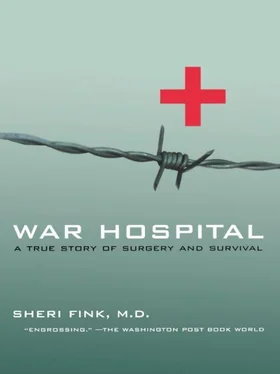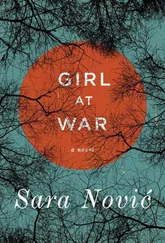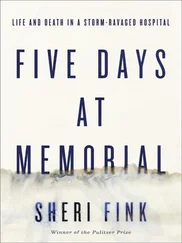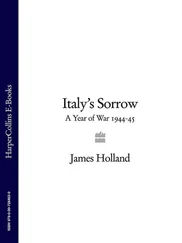The U.N. soldiers would fight to defend Eric’s life, but not the lives of the children and civilians living in Sarajevo. This shocked him. It seemed surreal. He didn’t want the force to protect aid deliveries. He wanted it to shoot back at the cowardly soldiers who were lobbing their shells at civilians.
CANCER WAS STEALING ILIJAZ’S FATHER. It stole his breath, his words. So weak he could barely stand, he seemed to have strength only for the terrible, unnatural cough that racked him.
Each day compounded Ilijaz’s sense of helplessness as a doctor and a son. Before the war, the diagnosis had been devastating, the family’s struggle intense, but at least they’d had hope. While lung cancer would kill him in a matter of months if left untreated, chemotherapy and surgery offered a shot at survival. The war had erased this chance. Front lines blocked access to a modern hospital. Ilijaz had only painkillers and asthma medicines to help ease some of his father’s symptoms while he waited out the war, mainly in the basement.
The two-story home faced Serbia and the tanks on Tara Mountain. One late afternoon, the entire family was coughing and choking much as Ilijaz’s father, trapped in the basement as smoke thickened the air in the wake of a strong explosion. The earth and the house above shook so violently that Ilijaz was afraid of being buried alive. Somehow, the structure held and all of them survived.
As the days passed, Ilijaz’s father remained selfless, able to see beyond his own suffering and aware of the larger situation in the region. Even as he grew sicker, he encouraged Ilijaz to go out and help others rather than stay with him.
“It’s more important for you to be on the field,” he would say. “There are many people who need you.”
It took more courage for Ilijaz to sit at home and watch his father suffer than to confront the Serb army with his band of lightly armed men. The risk of death for himself was abstract and random, but his father’s illness made life seem too fragile. He was more afraid for his father than for himself.
Ilijaz’s father died with Ilijaz beside him the morning of July 10, 1992, less than three months after the beginning of the war. Without treatment, the cancer had progressed so quickly. They buried him that afternoon on family property. News traveled fast and hundreds of men arrived to recite the Muslim dženaza prayers of mourning.
After the burial, Ilijaz refused to leave his father’s grave. His two medical technicians, Sulejman and Naim, and other friends did their best to comfort him, and then respected his wishes and left him alone. The part of Ilijaz that was a doctor had known his father’s cancer was progressing rapidly and that he might soon die. But as a son there was no way to accept or even conceive of a parent’s death. It caught him unprepared. Ilijaz wasn’t a crier, in fact he couldn’t remember a single time he had cried in his youth. Now he sat at the graveside and sobbed for what seemed like hours. He felt completely helpless, like a child.
The next day he set out with twelve volunteers to join a risky offensive—a coordinated action of local militias for a high point in an area called Shpat from which Chetnik gunners and artillerists targeted Srebrenica and launched attacks on Muslim villages. Having heard about the death in Ilijaz’s family, the others expected his unit to sit this one out. He felt he had to go, though he knew that an irrational, momentary zeal was driving him. Inat . The desire for revenge.
The battles were to be staged from the area where Fatima was living, and he was pretty sure he’d be able to meet her. For the first time since the war began, Ilijaz and nearly a dozen of his neighbors trod the dangerous paths to her village. When he arrived, he waited by a water well, chatting with two other men as an acquaintance went inside a house to summon her.
Fatima stepped through the doorway. For a long moment she just stood and stared, as if unable to identify him. He hadn’t thought of how three months of war and the stress of his father’s illness and death might have changed him. In fact, Ilijaz had turned from tall and slender to gaunt. He had let his dark hair grow long around his wide forehead, and he wore a long, scraggly beard that curved under his chin, leaving a dollop of hair below his lower lip. His small eyes gleamed, and above them a fuzz of hair sprouted between his thick, arched brows.
That day he carried his weapons and wore what had become his typical battle uniform—a white bandanna around his forehead and his old, black gym suit. Fatima knew that gym suit well, and at last a smile of recognition spread across her lips. Ilijaz smiled back and familiar creases formed under his cheeks. She embraced him, breathing in his strong, familiar smell.
That night Fatima listened to Ilijaz talk about his father. Ilijaz seemed sad to her, but she noticed he was able to smile. She figured that all the death he’d seen these last few months had toughened him.
She told him about her work in the field, similar to his, although she hadn’t become a fighter. She didn’t consider the young men who defended themselves, their villages, and her and her family as soldiers. They were protectors—civilians who’d been forced to take up whatever weapons they had and try to protect local Muslim villages from being overtaken by the Serbs and “ethnically cleansed” like so many others. The problem was, these men, in their youth, were fearless. She instructed them in first aid, trying to force them to understand that they faced real danger.
She went everywhere the fighters went, at first following a few feet behind them for safety. That changed the first time they came under fire. The man assigned to protect her froze in place shaking with fear.
“What are you doing?” she demanded. He told her, in a quavering voice, that he couldn’t move his legs. That’s when she’d asked for her own gun. They gave her a small Beretta 7.2 pistol, made in Italy. She kept it close at hand in case she needed to defend herself or her patients. It was a doctor’s right, under international war law, but it earned her strange looks. The sight of a longhaired woman packing a gun in her back pants waist surprised the old-fashioned villagers.
Ilijaz and Fatima talked about wanting to be together again and how to find a way to do it. For now, while the inhabitants of their own areas needed them, they couldn’t come up with any good options.
The fighting started early the next morning, July 12. This time Ilijaz refused to stand back. He pushed to the front of the lines and started shooting. He shot and he shot. For the first time, he felt pure hatred in his heart. The past weeks of the war he had insisted to the men from his village that they wouldn’t commit atrocities like the Chetniks did, but at this moment he could have strangled every Serb in the world. Something in him had broken.
Ilijaz approached a clearing and lay down behind a stone. He saw what he thought was a Serb bunker about 250 yards away. Fury filled him with the urge to destroy it. His father had suffered and died. The men in the bunker were guilty. He stood up tall and strode toward them without a thought of what could happen or a plan in case something went wrong.
A string of bullets whizzed inches from his legs.
“Get back!” someone shouted.
Ilijaz turned around and several of his men grabbed him. They were furious at him for taking such a risk. They told him they needed him alive; they needed him as their doctor. But a doctor’s role was to fix things, stop suffering, solve problems. How could Ilijaz fix the war using only the tools of medicine?
The locals took casualties, but their offensive succeeded. They pushed back the Chetniks and captured some Serb-held villages. At the end of the day, Serbs’ houses were burning and several dozen had been killed, including some—perhaps many—civilians. The Muslims had chosen a Serb Orthodox holiday for their attack: Petrovdan, St. Peter’s Day, the Patron Saint day of the church in the nearby mining town of Sase. They had also captured and destroyed a village called Zalazje, the loss of which was highly symbolic for the Serbs, who had suffered a massacre of forty persons there during World War II.
Читать дальше












